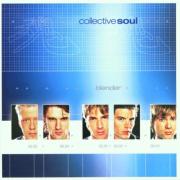
At first glance, the cover of Blender makes Collective Soul look like a boy band - pictures of five guys with stern faces glaring intently back at the disc's owner, accompanied by various hues of blue and flashy graphics. N*Sync fans retreat, however, when they take the CD for a spin and discover this isn't bubblegum flavored pop. Sure, some songs contain a certain pop flair, but the majority of Blender is exactly what the name implies: a mixture of heavy rock, pop, soul, articulate ballads, and whatever else the band could throw into the dish. Kind of like a musical fruit salad.
But more than anything, Blender is a tragic love story. Tragic in the sense that our unnamed protagonist, who classifies himself as a bonafide ladies' man, is a dunce and never really grasps what true love is all about. Collective Soul begins our tale gleefully with the guitar-laden "Skin.". The protagonist is clearly infected with lust, and misses out on a relationship with Jesus in order to feed his worldly desires, namely, with sex. This brings about his contentment for a while, until problems develop in the relationship and the two begin to "Vent." Here we find out that not only is our hero mindless, but he has a superiority complex as well, reveling in arguments with his significant other until she is finally forced to leave him. Feeling remorseful, he lashes out during "Why Pt. 2": "Yeah, you leave, you're gone, and I'm left here with the blame / so tell me why it don't feel the same." Apologies don't seem to work, however, and while the woman adores putting him through this torture, the protagonist has a decade to reflect, ease his mind, and try to make himself a better person. "10 Yrs. Later" we see exactly how far he has come. Still reflecting on his loved one, he ponders if she still thinks of him, and getting caught up in the moment, breaks down in tears. In "Boast," the protagonist hides his pain in lofty words and meaningless promises, and finally receives a second chance to win back his lost love in "Turn Around." Yet, he struggles with the decision as he is afraid that history will repeat itself. We hear a piece of his open-ended conversation: "Still I'm here defining my own truth / paranoia by conclusion, what's the point if I'm still missing you?" Faced with choosing between God's truth and a fleeting moment, he instead chooses the moment, lauding adoration upon his rekindled love in "You Speak My Language." Then in "After All," realizing his fatal mistake, he quickly takes back his words and confesses "lately it seems we've been chasing what time's resolved / and maybe...there's nothing here after all." Now the protagonist is determined to get his life into perspective, while his unscathed other moves on to have a "Perfect Day." At this point he realizes that she valued her own freedom over his love. Finally, our hero resolves to search for true happiness and thinks he will find it somewhere "Over Tokyo," where there are no memories and no hurting. Running from one's problems is not a substitute for our freedom in Christ, however, and tragically our story ends with an ironic "Happiness;" the deluded protagonist passes by a love relationship with God once again only to find himself in the same situation in which he started. His own moral to the story? "Happiness is more than a kiss, you know."
Collective Soul strives to set the best possible mood to this tale through the music. The introduction ("Skin") and conclusion ("Happiness") of the story are both smooth rock tracks with plenty of distortion and electric guitar. "Vent" features a fast-paced introduction and impressive keyboard work, but becomes more relaxed after a few seconds into the song. Unfortunately, it's marred by lead singer Ed Roland's repeated use of the word "p---k." On the other hand, "You Speak My Language" is a pounding four minutes of sonic six-string sound and is probably the heaviest rock track found on Blender. More mellow, pop-influenced tunes include "Boast," which has some exclusive, awesome guitar work of its own, "Over Tokyo," and "Perfect Day," featuring guest vocals and piano by Elton John. While we in no way recommend Elton John for the lifestyle he lives, his musical presence on this track is surprisingly welcome, adding a clean, bluesy/jazz feel that makes the song worthy of repetitive listens. "10 Yrs. Later" and "Turn Around" are also slower and laid-back, but each has a prize in the bottom of the bag. "10 Yrs. Later" features one of the best guitar solos on the record, and "Turn Around" finds Ed Roland suddenly screaming and thrashing his guitar during the bridge. Unexpected as they are, these Easter eggs add a brief and sudden twist to two tracks that would usually be considered ballads.
Unlike most previous Collective Soul albums, there is very little, if any, spiritual content on Blender. Instead, the CD sends mixed messages about love and lust and seems to provide listeners with all of the wrong answers. Both "Skin" and "Happiness" imply that sex is enough to satisfy. Furthermore, the vibe received after listening to the album is overall negative, despite the music's ingenuity. Roland's usage of the expletive on "Vent" also corrupts the listening mood, making it difficult to stomach the rest of the song. Blender is a strong, rock-fronted project, and most lyrics will fly over the heads of small children. However, due to the aforementioned points this album is best suited for listening by mature audiences ages 16 and over.